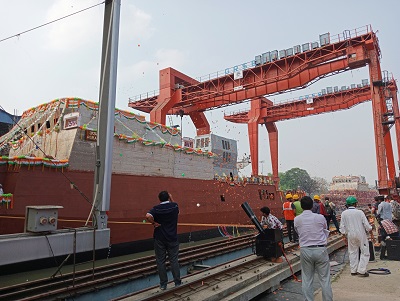Kolkata, (Samajweekly) Garden Reach Shipbuilders and Engineers (GRSE) Ltd is set to deliver the INS Himgiri to the Indian Navy around mid-2025, Cmde P.R. Hari, IN (retd), chairman and managing director, GRSE, said on Wednesday.
The INS Himgiri is the first in a series of three P-17A advanced guided missile stealth frigates being built by the shipyard.
Apart from these, GRSE is currently building 15 more warships for the Indian Navy, including 8 Anti-Submarine Warfare Shallow Water Crafts (ASW SWCs) and 4 Next Generation Offshore Patrol Vessels.
“We shall deliver the first 17A frigate well within schedule by mid-2025. Both the Navy and Coast Guard are in a fleet expansion mode and are keen to place orders with Indian shipyards. Hence, we are looking to more orders in the days to come.
“Among the high value projects in which we are keen to participate is one for 8 Next Generation Corvettes. The Navy also wants Next Generation Survey Vessels and 22 Water Jet Fast Attack Crafts. GRSE is keeping up with the latest technology, and we are even developing Artificial Intelligence (AI)-based autonomous vehicles. After all, AI is likely to control warfare in the near future,” Cmde Hari said on the sidelines of the twin launches of two ASW SWCs.
These are the 5th and 6th in the series of eight being built at the Kolkata-based shipyard.
The ASW SWCs were launched by Neeta Chaudhari, wife of Air Chief Marshal V.R. Chaudhari, Chief of the Air Staff, Indian Air Force.
Air Chief Marshal Chaudhari was the chief guest at the event and showered praise on the GRSE for upholding India’s pledge towards self-sufficiency in defence production.
“The design and manufacture of such platforms reveal the GRSE’s capability and versatility. It is certainly a matter of immense pride that India is today among the group of select nations that can build such platforms. Protection of our sea lanes for the safe movement of merchant vessels is crucial, after all. All are aware of the goings-on around the Red Sea and the large deployment of our naval platforms in that region. No wonder the Indian Navy is keen to expand its fleet. What is crucial here is that the majority of the equipment used for the platforms being built at GRSE are sourced from Indian manufacturers,” Air Chief Marshal Chaudhari said.
The two warships launched during the day have been named INS Agray and INS Akshay. These ships are actually reincarnations of Abhay-class anti-submarine warfare corvettes.
While the original INS Agray was decommissioned in 2017, the INS Akshay was decommissioned in 2022.
What made the twin launches more significant was the fact that this is the first time that GRSE has launched two warships of the same class together for the Navy.
The twin launches came less than four months after the launch of the 4th warship of this class.
Over the last 63 years, GRSE has delivered 108 platforms to the Navy and Coast Guard. Seventy-one of these have gone to the Navy.
The primary role of an ASW SWC is to conduct anti-submarine operations in coastal waters, Low Intensity Maritime Operations (LIMO) and mine laying operations.
These 77.6-metre-long and 10.5-metre-wide extremely potent warships are also capable of full-scale sub-surface surveillance of coastal waters, various surface platforms and coordinated anti-submarine operations with aircraft.
The ASW SWCs are compact waterjet-propelled ships capable of reaching maximum speeds of 25 knots. These ships pack a lethal anti-submarine suite comprising lightweight torpedoes, ASW rockets and mines. They are also armed with 30 mm Close-in Weapon System and 12.7 mm Stabilised Remote-Control Guns. The platforms are fitted with a Hull Mounted Sonar and a Low-Frequency Variable Depth Sonar.
“At GRSE, we have diversified from warships to weapons systems and commercial vessels. We look forward to more orders for weapons-intensive platforms,” Cmde Hari added.










